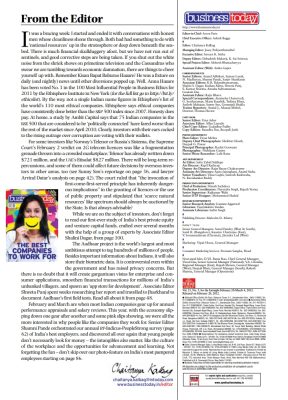The Best Companies to Work For
[Business Today]
Published date: 4th Mar 2012
It was a bracing week: I started and ended it with conversations with honest men whose cleanliness shone through. Both had had something to do with ‘national resources’ up in the stratosphere or deep down beneath the seabed. There is much financial skullduggery afoot, but we have not run out of sentinels, and good corrective steps are being taken. If you shut out the white noise from the shriek shows on primetime television and the Cassandras who swear we are tumbling towards economic damnation, there are things to cheer yourself up with. Remember Kisan Bapat Baburao Hazare? He was a fixture on daily (and nightly) news until other diversions popped up. Well, Anna Hazare has been voted No. 1 in the 100 Most Influential People in Business Ethics for 2011 by the Ethisphere Institute in New York (for the full list go to http://bit.ly/ethicslist). By the way, not a single Indian name figures in Ethisphere’s list of the world’s 110 most ethical companies. Ethisphere says ethical companies have consistently done better than the S&P 500 index since 2007. Honesty does pay. At home, a study by Ambit Capital says that 75 Indian companies in the BSE 500 that are considered to be ‘politically connected’ have fared worse than the rest of the market since April 2010. Clearly, investors with their ears cocked to the rising outrage over corruption are voting with their wallets.
For some investors like Norway’s ‘Telenor or Russia’s Sistema, the Supreme Court’s February 2 verdict on 2G telecom licences was like a fragmentation grenade thrown into a crowded marketplace. Telenor has already written down $721 million, and the UAE’s Etisalat $827 million. There will be long-term repercussions, and some of them could affect future decisions by overseas investors in other areas, too (see Sunny Sen’s reportage on page 36, and lawyer Arvind Datar’s analysis on page 42). The court ruled that “the invocation of first-come-first-served principle has inherently dangerous implications” in the granting of licences or the use of public property and stipulated that ‘scarce natural resources’ like spectrum should always be auctioned by the State. Is that always advisable?
While we are on the subject of investors, don’t forget to read our first-ever study of India’s best private equity and venture capital funds, crafted over several months with the help of a group of experts by Associate Editor Shalini Dagar, from page 100.
The Aadhaar project is the world’s largest and most ambitious attempt to tag hundreds of millions of people. Besides important information about Indians, it will also store their biometric data. It is controversial even within the government and has raised privacy concerns. But there is no doubt that it will create gargantuan vistas for enterprise and consumer applications, smoothen financial transactions for millions of India’s unbanked villagers, and spawn an ‘app store for development’. Associate Editor Shweta Punj spent weeks researching her report and travelled to Jharkhand to document Aadhaar’s first field tests. Read all about it from page 48.
February and March are when most Indian companies gear up for annual performance appraisals and salary reviews. This year, with the economy slipping down one gear after another and some pink slips showing, we were all the more interested in why people like the companies they work for. Senior Editor Shamni Pande orchestrated our annual BT-Indicus-PeopleStrong survey (page 62) of India’s best employers, and discovered all over again that young people don’t necessarily look for money – the intangibles also matter, like the culture of the workplace and the opportunities for advancement and learning. Not forgetting the fun-don’t skip over our photo-feature on India’s most pampered employees starting on page 86.






